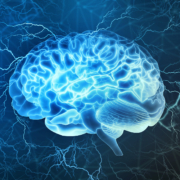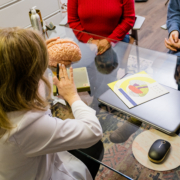What not to miss at the 43rd annual NAN Conference
The National Academy of Neuropsychology (NAN) is set to celebrate its 43rd annual conference this week in Philadelphia, and the event is shaping up to be interesting, informative, and integral to understanding where brain science is headed.
NAN has lined up dozens of speakers to present an eclectic program. These neuropsychologists and other researchers will opine on everything from concussions to the Mediterranean Diet.
NAN Executive Director Dr. Bill Perry said he is looking forward to the breadth and depth of expertise.
“Neuropsychologists are always the busiest people I know,” he said. “This is the one time all year when we stop what we’re doing, get together and listen to each other to get a sense of what we’re all doing and where the field is heading next. Year after year, NAN is excited to be able to facilitate this confluence of minds.”
There are 52 sessions over three-and-a-half days of programming at the Philadelphia Marriott Downtown. Here are just some of the sessions about which attendees undoubtedly will be talking:
Wednesday, October 25
First, in a welcome plenary titled, “Three Lessons About the Brain (or Stuff I’ve Learned From Studying Emotion),” Dr. Lisa Feldman Barrett will describe three insights about brain architecture and the corresponding computational affordances from the science of emotion. The welcome session begins promptly at 1:15 p.m.
Later in the afternoon, Dr. Michelle C. Carlson will deliver a talk titled, “Promoting Cognitive and Brain Health through Social Engagement and Neighborhood Factors.” This talk will summarize work increasingly focused on multi-domain dementia prevention interventions and describe work that incorporates social and productive engagement. Dr. Carlson also will describe the rationale for research examining the intersection of individuals and their environment or neighborhood, when examining cognition, function, and brain health.
Toward the end of the day, Dr. Paul Thomas Maruff will discuss the intersection of cognitive dysfunction and preclinical Alzheimer’s Disease. Dr. Maruff will highlight how attempting to understand this disease stage with both conventional and computerized cognitive tests provide new challenges and lessons for the field of neuropsychology. The talk is titled, “The Nature and Magnitude of Cognitive Dysfunction in Preclinical Alzheimer’s Disease: What The Disease Tells Us About Neuropsychology and What Neuropsychology Tells Us About The Disease.”
Thursday, October 26
Day 2 of the conference kicks off with a symposium titled, “The SuperAging Research Initiative: Identifying Protective Factors to Promote Healthspan.” Because the initiative spans three sites, this particular talk will comprise three speakers. Dr. Emily J. Rogalski will provide an overview of the initiative including rationale, known features, current progress, and new directions. Dr. Amanda Cook Maher will provide insights on outreach, recruitment, and engagement approaches. Dr. Angela C. Roberts will describe the innovative remote data collection protocol and initial observations from the wearable technology used in the study, which is designed to quantify measurements of daily life including sleep, physical activity, autonomic responsivity, and social engagement.
Next, Dr. Gayathri J. Dowling will deliver a talk titled, “The Adolescent Brain Cognitive Development (ABCD): Opportunities for Scientific Discovery.” In this session, Dr. Dowling will describe the comprehensive nature of this longitudinal study (including the many different types of data being collected), and discuss emerging findings from the ABCD study and describe its potential value for understanding risk and resilience factors that influence adolescent development.
NAN Executive Director Dr. Bill Perry will deliver a talk on Thursday, as well—a session titled, “The Role of Neuropsychology in Evaluating Physician and Pilot Fitness for Duty: Ethical, Legal, and Clinical Considerations.” In this presentation, Dr. Perry will summarize the various types of physician assessments and the legal and ethical issues associated with each type. His co-presenter, Dr. Robert Elliott, president of Aerospace Health Institute—LAX, will describe the aviation evaluation process and the qualifications required to conduct mental health and neurocognitive evaluations required by the Federal Aviation Administration.
Finally, in a talk titled ” Positive Emotions in the Regulation of Stress: A Neuroaffective Model with Applications for Resilience,” Dr. Christian Waugh will introduce a neuroaffective model of how people use positive emotions to regulate their stress. This model contributes to the stress/emotion regulation and neuroscience literatures by outlining multiple psychological mechanisms through which positive appraisal helps promote resilient responses.
Friday, October 27
The third day of the conference is by far the busiest, with several talks happening simultaneously during the morning session.
One from Dr. Robert Motl, titled, “Effects of Exercise on Cognition and Other Variables in Multiple Sclerosis,” will review the evidence regarding the effects of exercise training on cognition, mobility, and quality of life in people with multiple sclerosis (MS); another. In another talk titled, “Neuropsychological Outcomes in Pediatric Cancer Survivors: Clinical Management and Emerging Research,” Dr. Peter Stavinoha and Dr. Marsha Gragert will provide an overview of the current understanding of factors associated with cognitive and educational outcomes for pediatric cancer survivors.
After lunch, Dr. Gabriel de Erausquin will deliver findings from recent research into cognitive impairment profiles of older adults after SARS-CoV-2 infection as part of a talk titled, “Alzheimer’s Association Consortium on Chronic Neuropsychiatric Sequelae of SARS-CoV-2.” (BrainWise published a Q&A with Dr. de Erausquin earlier this year.)
To end the day, Dr. Maria T. Schultheis will drive (see what we did there?) a discussion about how technology can help patients drive after neurological compromise. Titled “Technology, Cognition and Driving: What Have We Learned and Where Are We Going?” the talk will summarize current research in this area and highlight emerging technologies that can further contribute to understanding of brain-behavior functioning.
Saturday, October 28
The final day of the conference is a short one, and several early-morning talks are compelling.
A workshop titled, “Social Justice and Brain Health Science Futures: Testing, Training and Research Applications,” will offer offers professional development though a lens of social justice that builds upon available empirical evidence and historic records to establish foundational understanding of the current scientific landscape of brain health disparities. Led by Dr. Desiree A. Byrd, the talk also will inform practice enhancements for clinical and research evaluations that yield equitable assessment experiences for populations most susceptible to brain health disparities.
In another morning session titled “Technology Strategies that Support Cognition to Improve Health and Everyday Function,” Dr. Maureen Schmitter Edgecombe and Dr. Tania Giovannetti will discuss and share findings from clinical studies that use personal technologies, including smartphones, smart watches, tablets, and laptops to scale and deliver cognitive interventions that support cognitive abilities and improve everyday function.
The conference will conclude with a plenary session delivered by Dr. Antonio Damasio during which he will explore the biology and psychology of human consciousness. The closing plenary will begin promptly at 9:30 a.m.
BrainWise Managing Editor Matt Villano will be on site publishing daily reports from the conference. Also be sure to follow the official BrainWise Instagram account for more.
Finally, if you’re a neuropsychologist and you’re attending the conference this week, be sure to check out this article, from The New York Times, about the best 25 restaurants in Philadelphia right now.









